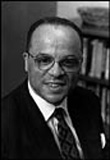
 |
 |
Name:
|
 |
Reverend Frederick J. Streets
|
| Month |
June 2004
|
| Schools: |
Yale University, M. Div.
Yeshiva University, D.S.W.
|
| Organization: |
Yale University
|
| Title: |
Chaplain of Yale University; Senior Pastor of the Church of Christ in Yale
|
Black Ivy: African American Chaplains at Ivy League Institutions©
by Frederick J. Streets
Chaplain, Yale University
Local congregations and their Pastors are well-known and visible models of ministry among African Americans. To a lesser degree Blacks serving as campus ministers at Black colleges are familiar roles among some African Americans. A number of African American members of the academy have become known as "public intellectuals" often addressing issues that are important to the Black community. Black clergy are increasingly exerting leadership on predominantly white campuses and addressing the concerns of the Black community and contributing to the intellectual life of the university.
Many colleges and universities have denominational chaplains or campus ministers who are employed by their denomination (Baptist, Methodist, Catholic and Jewish for example) to serve the needs of their particular constituents on campus. African Americans have traditionally served as Chaplains at Black colleges and in the military. African Americans are also playing a significant role as Chaplains at predominantly white educational institutions.
In 1953, the Christian theologian and mystic Howard Thurman became the first African American in the country to serve as Chaplain of a predominantly white university in the United States at Boston University. Among the eight Ivy League schools today, five of them (Columbia, Cornell, Harvard, University of Pennsylvania and Yale) have for the first time an African American serving as its University Chaplain. Each of these clergy are, by coincidence, ordained Baptist ministers.
They serve as role models and mentors for students. Some students, along with their parents, who consider attending these institutions, are encouraged by their work to make the college environment hospitable to their religious beliefs and practices. Their prominence in these institutions is an example of an area of ministerial practice for those interested in ministry to consider in addition to traditional congregational ministry.
Columbia University appointed as Chaplain in 1996 the Reverend Jewelnel Davis. The Reverend Kenneth I. Clarke, Sr., was selected as Director of Cornell United Religious Work in 2001. The Reverend Dr. Peter Gomes has served as the Pusey Minister in the Memorial Church at Harvard since 1970 and the Plummer Professor of Christian Morals since 1974. The University Chaplain and Special Advisor to the President at the University of Pennsylvania since 1996 is the Reverend William C. Gipson. Rev. Streets has been the Yale University Chaplain and Senior Pastor of the Church of Christ in Yale - the oldest college church in America founded in 1757 - since 1992 and a member of the faculty at Yale Divinity School since 1987.
African American University Chaplains are reinterpreting some aspects of the historically white Christian and Protestant ideology upon which these institutions were founded and practiced in some cases, for almost here centuries. In the process they are a part of the identity transformation and changes occurring in some of the traditions of these Universities.
Today Black Chaplains at Ivy League institutions are sometimes department administrators and may also be members of the faculty. These clergy are involved in the central life of the University community and serve the spiritual needs of the entire university community: they conduct chapel and worship services and offer prayers at commencement and other University events, provide counseling and pastoral care, help their communities address crises, and are involved in a wide range of activities that help to guide the institution.
Their work influences the moral climate of the campus community and helps it to engage a variety of complex and sometimes contentious local, national and global issues being addressed or debated on campus such as diversity, racism, sexism and conflict between religious and secular values.
They often help students, faculty and staff members to address the nature and role of religion in our society and in global affairs. University Chaplains may also contribute to the development of some of the policies the college or university may adopt. The chaplain's reach often extends beyond the campus as they address national and global concerns. Perhaps most importantly, they contribute to the formation of students many of whom will later assume positions of local, national, and international leadership.
African American Chaplains at predominantly white institutions bring with them aspects of the Black experience in America and a sense of the rich prophetic and redemptive traditions of Black religion and spirituality. In their our role as University Chaplain their constituents are influenced directly and indirectly by these dimensions of their experiences which contributes to their students intellectual life, spiritual formation and vision of society.
|